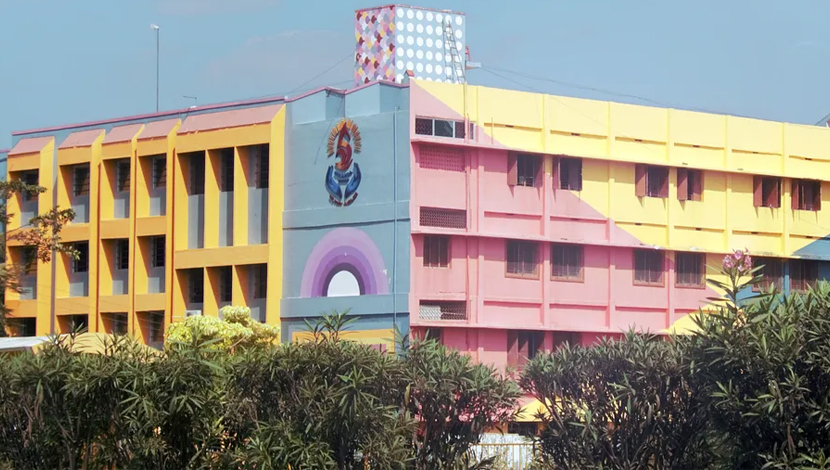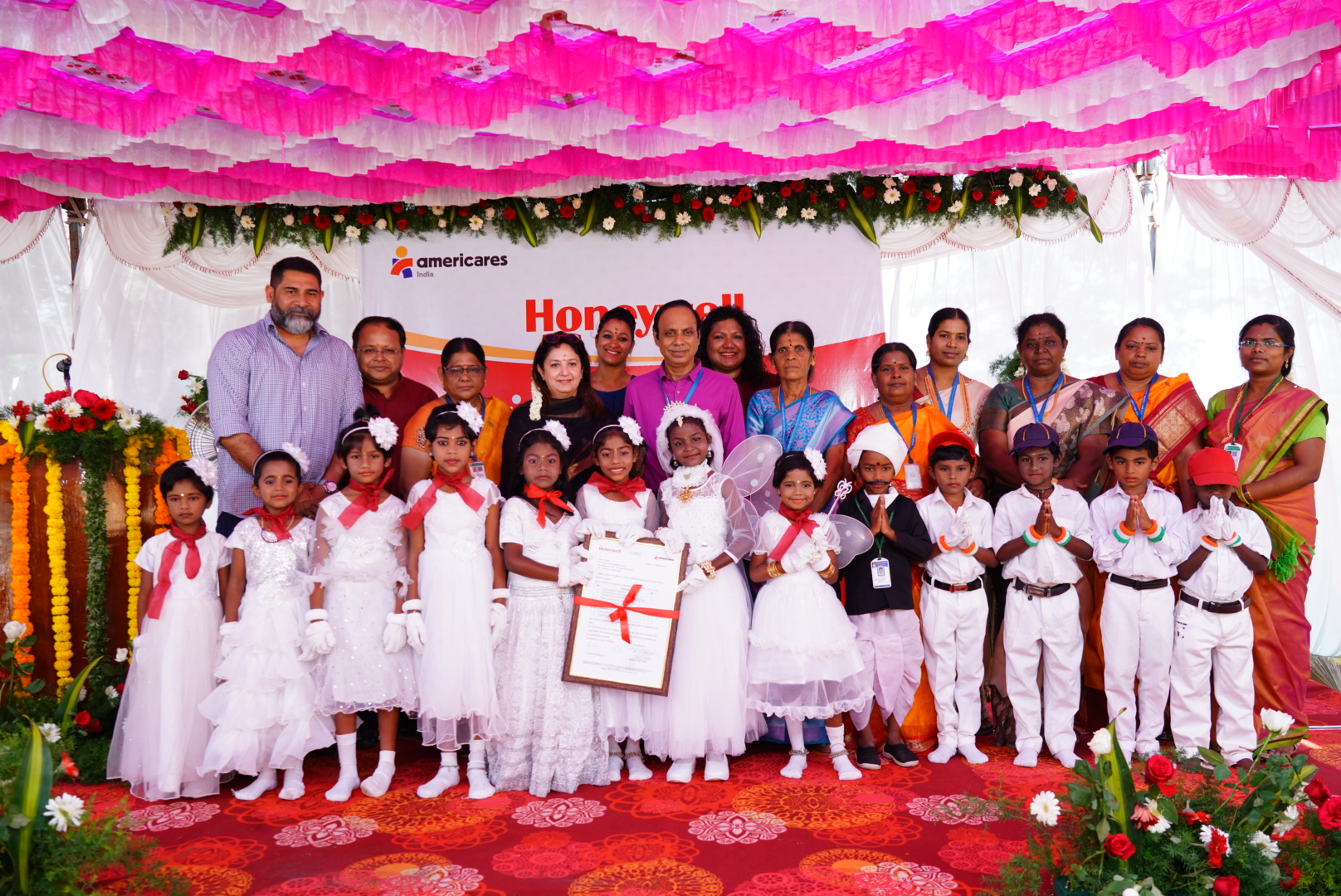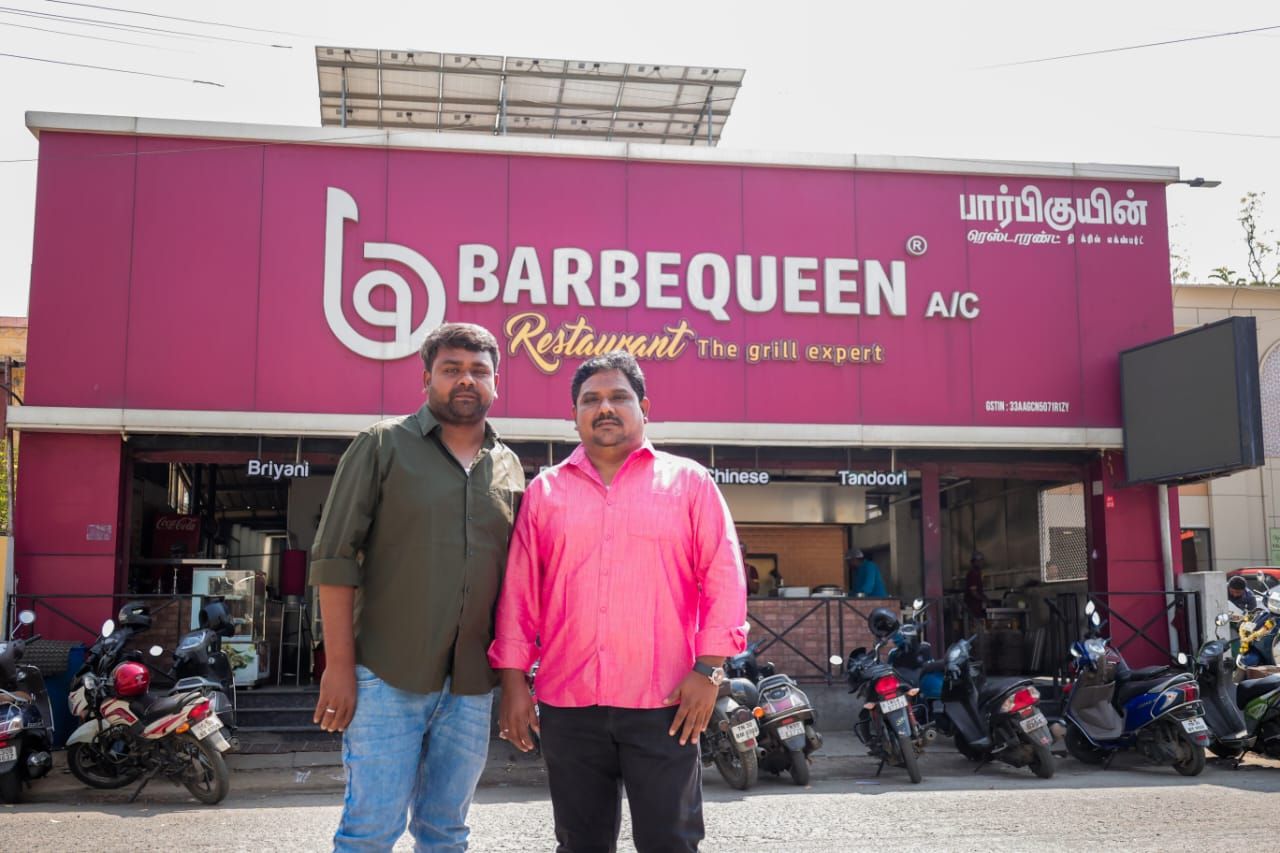Trending Now
- 830 voters names go missing in Kavundampalayam constituency
- If BJP comes to power we shall consider bringing back electoral bonds: Nirmala Sitaraman
- Monitoring at check posts between Kerala and TN intensified as bird flu gets virulent in Kerala
Tamilnadu News
Aspirations, Schools & The Waiting Debt Trap In Krishnagiri
![]() February 15, 2020
February 15, 2020
Hankering after private English medium school education has landed parents in a vicious debt cycle
“Everyone is using English now, who uses Tamil?” asks Jeeva.
33-year-old Jeeva V is a mother of three, two of whom are studying in a private English medium school 16 kilometres from their home in Pattiarkottai under Ennegole Pudur Village in Krishnagiri district of Tamil Nadu. “We are stuck here because we don’t know any other language,” she says. “It is like we are jailed. Had we got good education, we could have gone elsewhere to find work,” she says. “But we can’t.”
While Jeeva studied till 10th, her husband dropped out in 8th, a fate Jeeva says she does not want their children to inherit. “We are sending our children to English Medium school so that they can learn English. There are so many opportunities for those who know English,” she says. “Others are left behind.”
Her husband Varadharajan, now 41 years old, had started his youth as a farmer after dropping out. He does not till the fields any longer. With continuous cropping cycles coming to a nought because of severe water shortage, he moved away, for good, he says.
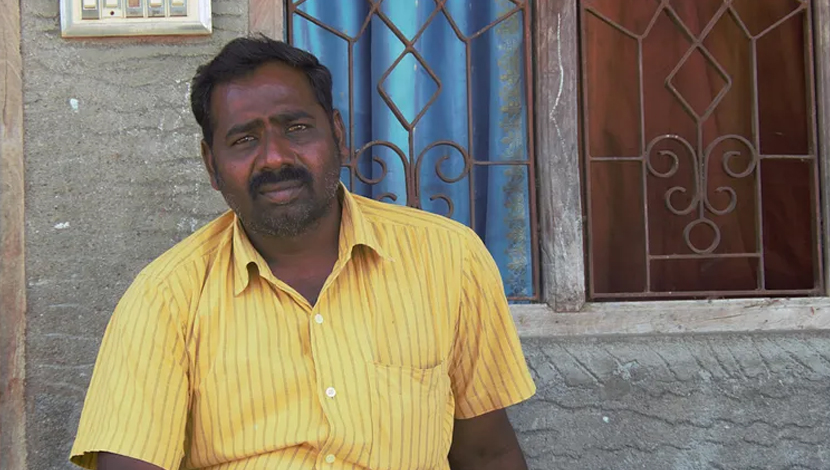
Varadharajan, a daily wage labourer
He still owns land – a quarter of an acre with deed and half an acre without deed. The lack of a deed prevents him from getting free electricity connection given by the state. “We sold the cattle we owned a few months back as it was becoming difficult to buy fodder and feed,” says Varadharajan. “With the money, we bought two goats.”
The oxen were the last remnants from his life as a farmer.
He now makes a living working as a mason, earning Rs 400 – 500 a day. But the work is irregular. “At best I find work 10-15 days a month,” he says.While Varadharajan’s monthly income fluctuates anywhere between Rs 5000 to Rs 7500, sending his two children in the private English medium school alone costs around Rs 4000 a month. Books, uniform and other expenses are extra burdens.
With no other sources of revenue, Varadharajan is strained to find other ways to meet the expenses. “We arrange money, one way or the other”, he says.
The Many Many Loans
“We took a loan from the Mahilai Sangam (Women’s Self Help Group) a few days back,” reveals Varadharajan when asked how. “Rs 60,000. Repayments have to be done over 24 months, Rs 3000 every month.”
The family has been taking loans from the Sangam for the past few years, he says. The loans are extended as a form of credit support for undertaking farming or such other activities. But Varadharajan uses it to pay school fees among others.
There are three forms of credit which can be availed by members. Loans have the highest interest rates. “I pay off one by borrowing from another. In between, I also have to run a house with whatever I earn.”
Asked if he ever defaulted, he says, “No matter what, the dues have to be paid on time. Else all the 18 women in the Sangam will come and sit here in my house. There is no question of defaulting.” But how the defaults are avoided raise questions.
“If someone says they are unable to pay, the members themselves will arrange money through a vaddi,” he says, referring to the money lenders who charge steep interest. “They are not outsiders. Just people who own land near the river. As their crops almost never fails, they have excess money which they lend.”
Asked how much debt has piled up over the years, Jeeva and Varadharajan say they are not sure.
“We will have to check the books,” says Jeeva.
“Maybe Rs 20,000 more from the Sangam apart from the loans we took now,” says Varadharajan. “Three times we have taken loan from the Sangam. Is it three or four?” he asks Jeeva, unsure.“We owe others money too. Money lenders, friends and others,” says Varadharajan.
With debt piling up, Jeeva and Varadharajan are mulling shifting their children to the government school nearby. Something which they do not openly accept nor deny when asked about.“The school does not teach well,” says Jeeva worried.
Private To Government To Private Again
41-year-old Sarasa Aanjaneyan lives opposite the Panchayat Union Primary (PUP) School in Kakkanpuram village of Krishnagiri district.
The school which runs classes up to 5th standard is amongst the best PUP schools in the district and has six teachers in lieu of a private company supporting it by paying salary for four teachers and investing in the school’s infrastructure.
Yet, Sarasa sends her two girl children, aged 5 and 11, to a private school many kilometres away, in a yellow school bus which levies an extra fee. The bus ferries children across the surrounding villages where English medium education has takers.
Sarasa was one of the parents who had put her children in government schools when the private school fees became too high to afford.“In the one year they studied in the PUP school, everything changed for the worse,” she says about the PUP school which is amongst the better run PUP schools.
“Reading, writing, discipline, speaking, everything changed.” And hence, after a year, she put them back in the English medium school.
“Compared to a year back, my children have definitely improved now,” she says, content with the quality of education she gets in the private school. “My eldest child had forgotten how to read, add or subtract,” she says.
“Now my youngest one reads name boards and has started spelling words even.”
But like many other such parents, Sarasa has no means to support the expenses involved.
“My husband is a daily wager,” she says. Sarasa and her husband, 52-year-old Aanjaneyan S are landless labourers.
While Aanjaneyan, a 12th standard dropout originally hailing from Kaveripattinam, works as an agricultural labourer, Sarasa, who went on to do a diploma in hotel management after her 12th, does tailoring.
Sarasa’s story reveals the aspirations of a previous generation and how the desperation that general lack of quality in government schools is pushing them towards private schools.
“We couldn’t study as we had no financial resources. We don’t want our children to go through the same,” she says. “Those studying in Tamil medium schools only get admitted to BA in college. It is useless. The quality of education in English medium schools is good. Those completing studies there have better options in life. If they score good marks in 10th and 12th, their future will be secured,” she says. But Sarasa does not have any plans for her children beyond 12th.
“We have to see how they do in 10th and 12th. I haven’t thought beyond that,” she says. “Many people who had studied with me have got good jobs as they had pursued private education later. I want my children to have good jobs too,” she explains as to why she is insistent on private education. But Sarasa is not much better off compared to her own parents.
“We don’t own any agricultural land,” she says. “Except for this small house we live in, we have nothing else.”
With the mud tiles on her house’s roof barely holding, the house is well past its prime.
Sarasa works as a tailor on a daily wage basis, earning Rs 100 a day. Her husband, Aanjaneyan on the other hand, earns Rs 400 a day but his work is seasonal.The school her children study in charges Rs 40,000 a year, for both the children combined.“But it comes close to Rs 50,000 a year including exam fees and other expenses we are asked to pay from time to time,” she says.
Devoid of a consistent source of income to allocate for the money she spends on education, Sarasa too has found other means to meet her needs.“We have taken a loan of Rs 60,000 from the Sangam this year,” she says. “The interest is Rs 2 per Rs 100 taken. Since we have taken Rs 60,000, we have to pay Rs 3000 every month for two years,” she says, not boggled by the calculations of viability.
“We haven’t taken any other loans. Education is the only thing we are spending on right now. Education is the most important thing in life. It is worth risking everything on.”
Asked what she will do next year to pay the fees, she says, “We will have to find some other means. I want my children to do well in life. That is why I am putting in the extra effort. If you see, many government schools don’t have toilets even, leave alone the poor teaching quality. Parents who send their children to government schools just leave it at the fact that their children are going to school and they might be learning something there. I cannot do that.”
And she is not alone.
The Perception Of Private Schools
39-year-old L Leelavathi who is a mother of two boys studying in 9th and 11th classes say they have seen the results in the years gone by.
“In my village, whoever studied in government schools are doing farming while all who attended English medium schools have got some job. Since they have knowledge of English, they are able to go out and earn as well. Since the parents are paying, private schools pay much more attention to their students which makes them better off eventually,” she says. “That is not the case in government schools.”
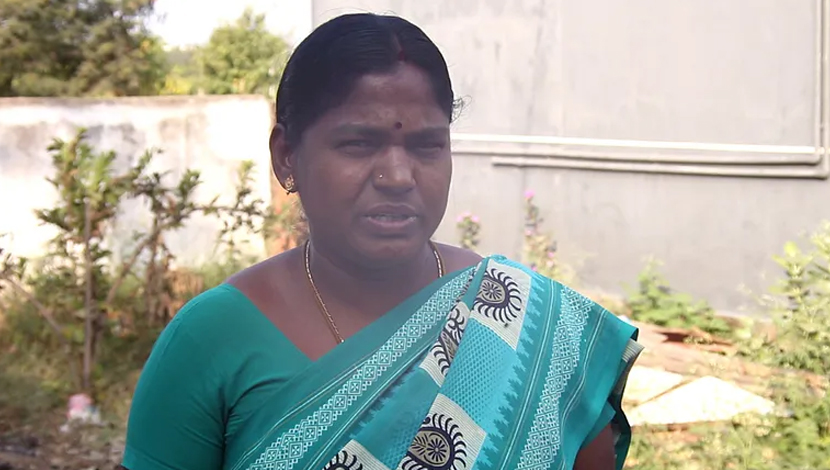
Leelavathi vouches for private schools
40-year-old T Amuthavalli, who is the mother of two girls studying in 9th and 10th standard, both admitted to a private school, cites similar reason for preferring private schools.
“I had shifted my children to government school for two years. They got worse at studies. I didn’t have a job then and couldn’t afford sending them to an English medium school any longer,” she says.
“Today, by the grace of God, I have a job. My children have gotten better now. For me what is even more important than studies is the safety of my children. At a younger age, it still felt okay in a government school. Now that they have grown older, I need to know that they are in a safe place.”
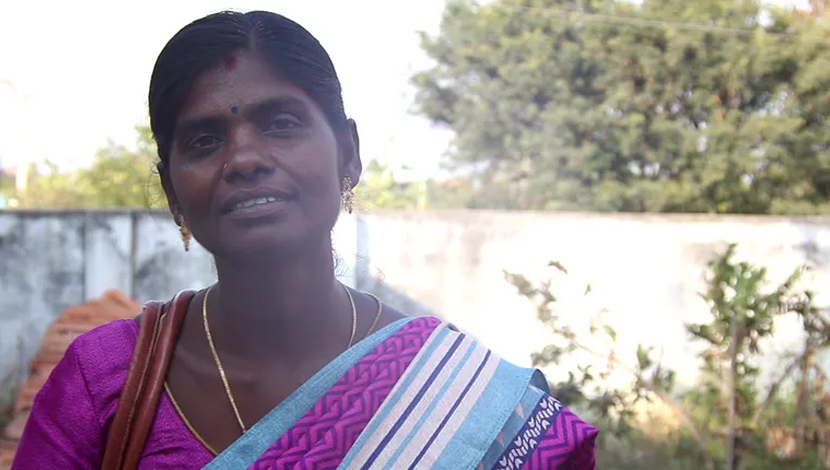
Amuthavalli too swears by private school education
32-year-old S Shiela, mother of a boy aged 12 and a girl aged 7 also says government schools do not do enough for the children.
“As far as I have seen, government schools don’t give as much care to children. They don’t instill discipline nor teach them how to interact socially. In private schools, since the management is in the school itself, they look into how the students are performing. Similarly, parents too demand teachers to attend to their children well as they are paying fees. The teachers are thus held responsible for how well their students do. But in government schools, whatever the teachers say or does, everyone else has to accept them as is and live with it.
Only the higher officials sitting above them have powers to force them. For this, they must visit the schools, evaluate the performance of students and ensure regular checks. How will this ever happen when they visit the school only once a month? And even when they do come, they only look into how many are present or absent and nothing more. That is how much they care. They don’t look into whether all the students are studying. Private schools do that,” she says.
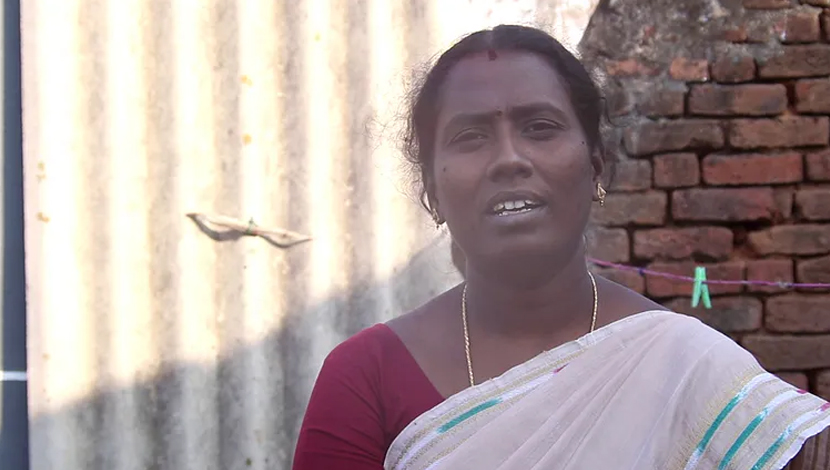
Shiela feels private schools can be questioned since fees are paid by parents
While parents might have their heart at the right place when sending their children to private schools, the debts they incur is a trap.
43-year-old P Maadhu a farmer, finds himself in a debt trap which he is unable to come out of.
The Vicious Debt Trap
“I am in debt because of farming and education of children,” says Maadhu P. His children are studying in classes 4th, 7th and 9th. A year ago, he abandoned farming. “The borewell alone cost me Rs 2 lakh and more.”
Not having proper deed to the land, Maadhu tried to dig out of his debt by taking a loan and digging a borewell.
“The plan was to grow tomato,” he says. But it didn’t work out as he was denied the free electricity that state provides farmers with proper land deeds.
“Even to get water from the borewell, we have to run a generator. Running the motor for an hour costs 3-4 litres of fuel in the generator. Who can afford that?” he asks. “It wasn’t feasible, so I stopped farming. Last year I got indebted by Rs 1 lakh,” he says. “Now the debts remain. I have a total debt of Rs 4 lakh,” he says. “Half of it is loss incurred in farming. The other half is school fees.”
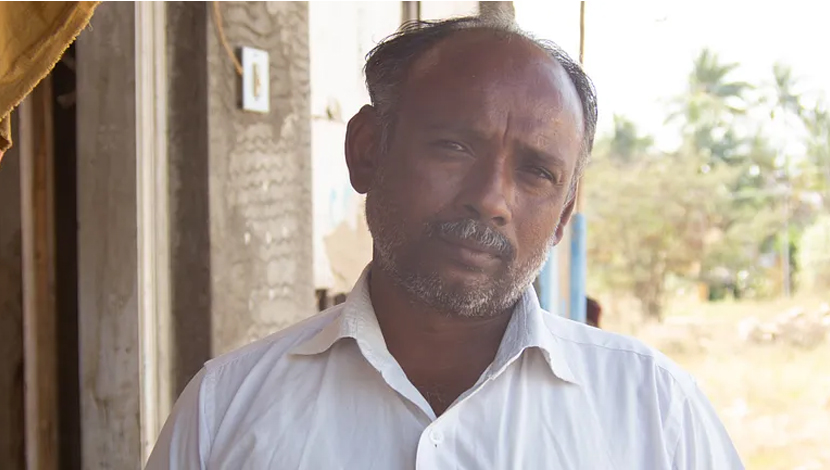
P Maadhu says he is caught in a debt trap
All three of his children are studying in private English medium schools. Their fees alone is a burden for Maadhu.
“The total expenses per year alone comes close to Rs 1,10,000,” he says.
Farming having failed, Maadhu now makes a living by working as a daily wager, earning Rs 450 a day. Life has forced him to take a turn for the worse he says. Belonging to MBC (Most Backward Class) category, Maadhu is not amongst the lowest in the caste hierarchy either.
For him education of his children seems to be the only way out. But his income is far from enough to keep his debts serviced.
“I owe around Rs 60,000 to the kandhuvaddi,” he says referring to the moneylender he owes money to. “I have availed a new loan from the Sangam two weeks back,” he explains his debt servicing scheme. “Rs 1,10,000 – With that I have paid a part of the debt and the children’s fees.”
Asked how much money he must pay monthly to keep his loans serviced, Maadhu is unsure.
“I think around Rs 6000 every month to the Sangam,” he says. But the total figure varies wildly from Rs 15,000, Rs 20,000 up to Rs 40,000. When asked for an exact figure he eventually says, “I don’t know how much exactly. There are other debts too. I borrow from one side to pay the other and that is how things are moving.”
There are far too many people who seem to be doing the same and sending their children to private schools.
The Big Picture
1,46,406 students out of the total 3,79,741 students studying in Krishnagiri district study in private English medium schools, a number accounting for 38.6% of the total children in schools in the district.
While the number of private schools of all syllabi is just 174, the total number of government schools is a whopping 1884. Leaving out the 1141 primary schools which teach only up to 5th standard, the secondary schools number 741.
Thus, while the average number of students in each private school is 841, the average number of students across all government schools is 123.8 per government school. Leaving out the primary schools, the number comes to 241.2 per government school.
While 155 of the 174 private schools or 90% of private schools have classes up to 10th, only 289 schools out of 1884 or 15% of government schools have classes up to 10th.
Leaving out the 1141 PUP schools, the percentage of schools with classes up to 10th is still only 38.5%.
Just to put things into perspective, the 1141 PUP schools are decried as the worst of the lot, with at least 300 schools running with just a single teacher while some estimates given by department officials suggests those numbers could be still higher.
The department by an order dated 31 January, a few days after The Lede contacted the department and a day after we published a story about the large number of single teacher schools in Krishnagiri, allowed teachers in PUP schools to appoint those meeting necessary qualifications to fill the vacancies on a temporary basis.
One of the schools The Lede reported from has since appointed a young girl just out of college as an assistant teacher to help the single teacher. But this is far from a permanent solution and is at best a makeshift arrangement.
The general numbers suggest that private schools are more vibrant with a greater number of students and are preferred despite the overwhelmingly large number of government schools in the district and the additional expenses which must be borne by parents themselves.
But none of these numbers capture the full picture says officials in the department of education in Krishnagiri, as the private schools and government schools are not comparable.
Why Private & Government Are Incomparable
“One cannot compare the private schools with government schools because of a lot of reasons,” says a senior official of the department of education, Krishnagiri. “The issue of parents flocking private English medium schools is not an issue in Krishnagiri alone. It is happening across Tamil Nadu. There are many reasons behind this, and some have merits to their arguments too. Many parents have studied only till 10th or even lower and want to see their children get good education, something that they missed out in their childhood.
It is so strong a sentiment that they are willing to take financial risks which may seem a tad too much. Another reason pulling parents towards private schools is the comparatively less developed infrastructural facilities in government schools. For example, many government schools don’t have proper toilets or running water or many such basic amenities. Unsurprisingly, the government schools pale in comparison to the massive seeming structures and the neatly painted classrooms that private schools flaunt.
Private schools also give a sense of security to the parents. While, government schools are freer, the parents feel that the private schools with their strictness, instill discipline among children. All of this has led to parents attaching prestige with sending their children to private schools. Prestige plays a big part.
If you see, not all these private schools give quality education either, but still many parents send their kids there by paying fees they cannot afford because of the prestige attached. But one simply cannot compare private schools with government schools. In one, education is a commodity and the parents are vigilant consumers while in government schools it is a basic service which is provided free of cost. This results in a difference in attitude among parents too.
While many parents of students studying in government schools are not in a position to care for their kids, those sending children to private schools put in extra efforts to care for their child’s studies as they are already paying hefty fees and want good returns for their investment. Parents in government schools won’t be willing to pay even an extra Rs 100 a month to appoint a teacher or to arrange special skills classes.
Compare this with private schools where if the teacher tells a parent to buy one book, they will be eager to buy 10. If the same amount of interest and effort is put in by parents in government schools, you will see the difference.
With no parental interest, whatever the government school students study is limited to the classrooms, whereas in private schools, additional attention is paid for by the parents themselves.
One can never blame the parents of government school students as the situation at their homes often warrant putting studies at a second pedestal. Many of them face difficulty arranging for three meals a day even. Even now, many come to school for the lunch and take home part of it to be had at night. In such a scenario education is not the primary concern for them,” explained the official.
According to data available, in 2013, almost one-third of the people in Krishnagiri district (32.44%) were living under poverty line.
“Many government schools lack sufficient teachers thereby further affecting teaching ability. But if you see, the government schoolteachers are much more qualified than those in private schools. Yet parents who are comparatively well off prefer not to put their children in such a surrounding as they feel their children could do better in private schools. It is a perception that has been carefully built. Exams like NEET have also contributed to this,” said the official.
Poor Quality In English Medium Schools
“There is no quality in private English medium schools either,” says Chella Selvakumar, General Secretary of Sama Kalvi Iyakkam, a Tamil Nadu based child rights movement.
“It is just a feeling that the parents have. They think that whoever is studying in English medium schools will become doctor and IAS. It is all a pipe dream. There are around 25 medical colleges in Tamil Nadu. Not everyone will get to become a doctor. Parents are just too eager to push the children to English medium schools.
The private school managements are also cleverly pushing ads pointing to coaching for IAS, NEET and what not. They will showcase achievement of 10 students and claim them as mark of proof of their general quality. What the ads hide is the fact that 90% of the students just come out plain mediocre.
This is what happens when education becomes a commodity to be sold. On the one hand government is reducing funding for education and withdrawing itself from a basic rights-based approach. On the other hand, multiple private schools are being allowed to start and operate.
Government is not even concerned about devising a good curriculum. Each government which comes to power toys with it as if it is a football. The society doesn’t care, neither do politicians. That is the situation. People lose confidence and are hence moving towards English medium schools paying hefty fees,” said Selvakumar.
Out Of Pocket Spending
“In Krishnagiri district, there has been a general shift away from government schools towards private English Medium education,” says Nimmy Theresa Antony, Program Officer with an NGO working closely with a PUP school in Krishnagiri as part of a village development project.
“Even when the government school has sufficient quality, many parents prefer to send their kids to private schools, indebting themselves in the process. Such out of pocket spending for school education forms a major cause of liability. Parents do it as long as they can afford. And when it becomes difficult to pay fees, they send them to government schools,” she says.
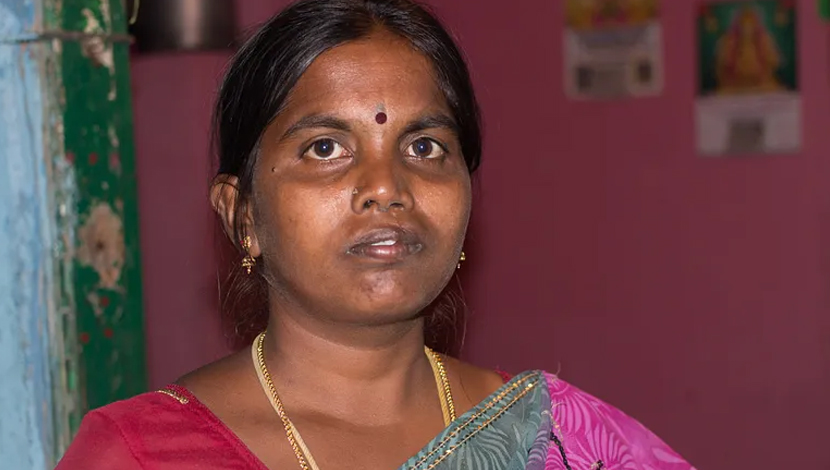
Having send her first child to a private school till 3rd standard, Madhammal P shifted him to a government school after having a third child.
“What is encouraging this trend is the false confidence that many parents have begun to live under by the easy lines of credits which are being extended across the state,” says Chella Selvakumar of Sama Kalvi Iyakkam.
“The SHGs extend loans even to those who already have debts, thereby giving a false sense of financial security encouraging people to live beyond their means. For those extending money to SHGs, it is a matter of meeting targets, but it is having widescale effects across the society. When the time for paying back comes, they get pressured. They borrow from one and pay the other and try to keep up for a while.
But this is possible up to a time only. Eventually it becomes difficult to keep up and debt catches up. Not everyone earns Rs 1000-1500 a day to be able to pay back loans. Most of the parents who take loans for children’s education would be earning Rs 350 to Rs 500 at the most.
When everything fails, the parents puts the children in government schools, some disappear and in extreme cases some commit suicide. The fault lies with the SHGs for encouraging parents to think that they can arrange money every time. Somehow or the other. Their aspirations are driven by what their neighbours are doing or what their relatives are doing. They don’t think about their own capabilities. The present situation is less palpable as the bubble is still growing,” says Nimmy Theresa. “The bubble hasn’t yet reached a stage where it has become obvious that it is about to burst.”
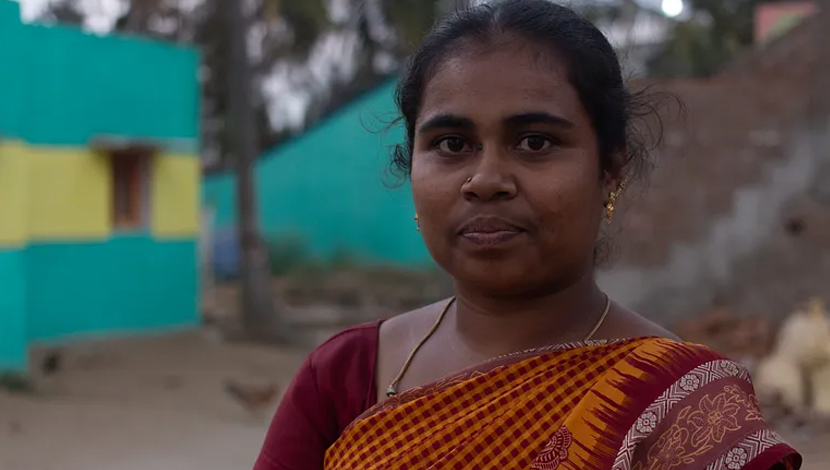
“Dropouts in government schools are high”, says Mangala Ramamoorthy who could not afford private school fees
“All of this is only going to increase dropouts,” says Chella Selvakumar.
Dropout is a word which most are tight lipped about in Krishnagiri. With many indices linked to it, it is often spoken about in hushed tones by government school teachers and officials alike.
“When the children are put back into government schools, with their families indebted beyond redemption, what else will they do?” he asks.
A Solution?
“The SHGs were started to help fund income generating activities,” says Nimmy Theresa. “If you look at what they are doing with the money, it is clear it is just encouraging indebtedness,” she says. “In that sense, it is serving the exact opposite of what it was meant to do.”
“The solution I think is for the parents to be made aware of what is happening,” says the senior government official. “There is an active attempt by the government to withdraw from the education sector altogether,” he says. “The policy of allowing private schools to come up has to be stopped. It should not be acceptable. But private schools are owned by millionaires. They are very powerful. Nothing can be done about it as things stands today.”
“Education is not just a basic right but is also the most basic requirement for the development of the country,” says Chella Selvakumar of Sama Kalvi Iyakkam.
“Parents aren’t protesting against the purposefully falling standards of government schools as they have been so nurtured by the government. It is government’s responsibility to ensure quality, not to pass it on to private players to profiteer from. It is high time government regulated mindless sprouting of private schools themselves. But it is only the crying child who gets milk. If the standards of government schools are low and that is what is pushing parents to private schools, they should be taking to the streets.
Do you see that happening? Parents don’t protest as they have been made submissive by the high-handed treatment of protests by successive governments.” They are also perhaps mesmerised by the aspirational offerings of private schools.
The official of the education department has another way of looking at it. “Kaasu vangi vote pottavarkku idhu than kidaikkum.” (Those who take money for votes will get just this.)
“Everything in this country is decided by politicians,” he explains. “When people cast vote by taking money, what right do they have to demand services? That is why they are silent.”
But the parents believe that English medium education is going to make all the difference.





